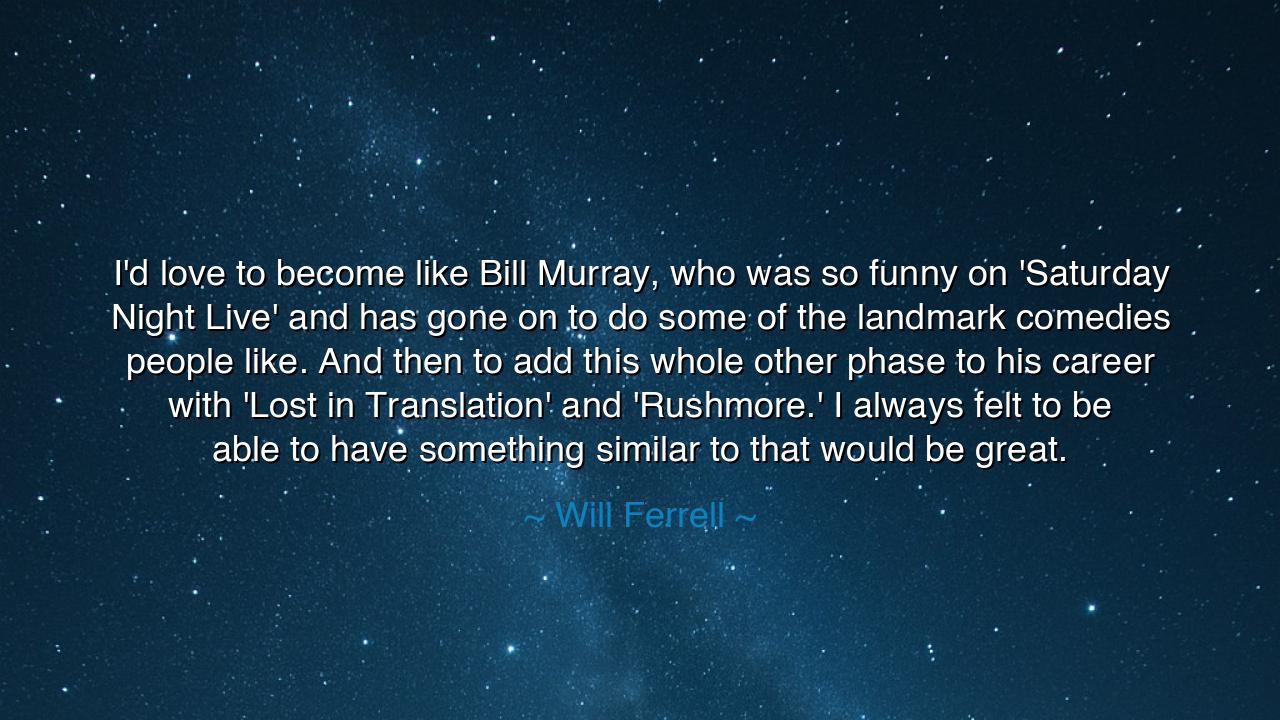
I'd love to become like Bill Murray, who was so funny on
I'd love to become like Bill Murray, who was so funny on 'Saturday Night Live' and has gone on to do some of the landmark comedies people like. And then to add this whole other phase to his career with 'Lost in Translation' and 'Rushmore.' I always felt to be able to have something similar to that would be great.






The words of Will Ferrell—“I’d love to become like Bill Murray, who was so funny on ‘Saturday Night Live’ and has gone on to do some of the landmark comedies people like. And then to add this whole other phase to his career with ‘Lost in Translation’ and ‘Rushmore.’ I always felt to be able to have something similar to that would be great.”—speak not only of admiration but of artistic evolution, the noble desire of a creator to transcend his own craft. Beneath the surface of this reflection lies a truth as old as the story of humankind: that every artist, every soul, must seek to grow beyond the boundaries of their first triumphs—to transform laughter into wisdom, performance into meaning, and fame into purpose.
Ferrell’s words honor the legacy of Bill Murray, not simply as a comedian, but as a being who embodies metamorphosis—a rare kind of transformation that few have the courage to embrace. Murray began as the fool who made the world laugh, yet he did not remain the fool. He stepped, like an alchemist, into deeper realms of art—turning humour into melancholy, irony into empathy, playfulness into reflection. Through works like “Lost in Translation” and “Rushmore,” he proved that the comedian’s mask can conceal a philosopher’s heart. Will Ferrell’s yearning to follow that path reveals his understanding that the true artist does not repeat himself; he evolves.
The ancients, too, revered those who changed form without losing essence. Consider Odysseus, the hero of many guises. He was warrior, wanderer, trickster, and sage—never still, always growing. The gods tested him not by the strength of his arm, but by the depth of his transformation. Like Odysseus, Ferrell speaks of the journey beyond comfort—the movement from jest to wisdom, from the laughter of the crowd to the quiet applause of time. He knows that to remain forever the clown is to become hollow, but to let the clown grow into the philosopher is to achieve immortality.
There is a sacred courage in this ambition, for the world often demands that artists remain what they once were. The audience clings to its memories, asking for the same laughter, the same persona, the same mask. Yet the soul of the artist yearns for the next horizon, the undiscovered truth. Will Ferrell’s words remind us that the path of the true creator is not to please endlessly but to risk transformation, even at the cost of misunderstanding. This is the hero’s road, paved not with applause, but with the deeper satisfaction of becoming whole.
In Bill Murray’s transformation, we see the eternal dance between light and shadow. His comedy gave joy, but his later work offered something even more profound—recognition. The laughter that once came from surprise turned into a smile of understanding, a quiet communion between performer and viewer. It is this sacred shift, from entertainment to enlightenment, that Ferrell longs to emulate. He seeks not merely to be funny, but to be true—to touch the spectrum of human experience, from delight to despair, from chaos to calm.
The lesson here reaches beyond the realm of art. Each of us, in our own way, begins with laughter—with the lightness of youth, the roles we play to belong. But there comes a time when we must grow into our depth. Like the actor shedding a role, we must dare to expand our identity—to allow ourselves to become more than what others expect. Just as Will Ferrell aspires to follow Murray’s evolution, so too must we transform laughter into wisdom, motion into meaning, and repetition into rebirth.
Therefore, let us heed this truth: never allow the world to imprison you within your first success. Whether in work, in love, or in spirit, strive for the second act—the deeper, quieter greatness that reveals your full humanity. Ferrell’s longing is not vanity; it is the sacred hunger for growth. To evolve is not to betray who you were, but to fulfill what you were always meant to become.
For in the end, this quote is not about fame or film, but about becoming whole. The fool who learns reflection becomes the sage; the performer who learns silence becomes the poet. And so it is with us all. Let your laughter lead you toward truth. Let your success be only the first step in a longer climb. For the greatest art, like the greatest life, is not born from what we repeat—but from what we dare to become.






AAdministratorAdministrator
Welcome, honored guests. Please leave a comment, we will respond soon